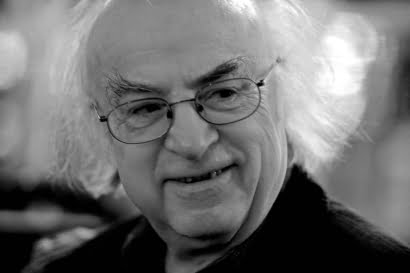
Norman Manea
- Romania, USA
- Zu Gast beim ilb: 2005, 2015
Norman Manea was born in Suceava, Bukovina, Romania, in 1936. As a child he was deported to a Transnistrian concentration camp in the Ukraine and he returned to Romania with surviving members of his family in 1945. Manea studied in Bucharest and worked as a hydraulic engineer. He published his first work of fiction in 1966, in the avant-garde literary magazine »Povestea Vorbii« (The Story of the Word) which was subsequently banned. He became a freelance writer in 1974 and published a string of socially critical novels, short stories and essays in quick succession, among them »Anii de ucenicie ai lui August Prostul« (1979; Engl: The Years of Apprenticeship of Augustus the Fool), »Octombrie, ora opt« (1981; Engl: October, Eight O’Clock, 1992) and »Plicul negru« (1986; Engl: The Black Envelope, 1995). In 2005 Manea was Holtzbrinck Fellow at the American Academy in Berlin.
Critics have compared his complex narrative strategies to Kafka, Joyce and Musil. In 1979 he was awarded the Literature Prize of the Bucharest Writers’ Association. Two years later, in an interview with the literary magazine »Familia«, he pleaded for a democratic opening up of the country as well for greater integrity of writers, sparking off a hostile official media campaign with anti-Semitic undertones. In 1984 he was awarded the Literature Prize of the Romanian Writers’ Union but was then denied the award under pressure from the state’s cultural authorities. »Plicul negru«, the last novel published in Romania before he decided to leave the country, provoked a sharp and prolonged conflict with the State’s censors, which the author went on to describe in his essay »The Censor’s Report« in the volume »Despre clovni: dictatorul si artistul« (1997; Engl: On Clowns: The Dictator and the Artist, 1992).
Even before any of his books came out abroad, in 1983 Heinrich Böll urged for his work to be published in the West. The first publication in Germany, »Roboterbiographie und andere Erzählungen« (Engl: Robot-Biography and Other Stories) appeared in 1987, when Manea was a guest of the DAAD. He then went on to the USA on a Fulbright scholarship and has been living there ever since. Although considered to be the most well-known and successful living Romanian writer, he is still the subject of controversy in his home country, due to an essay on Mircea Eliade and his involvement with Fascism, published in 1991, which set off a fierce and lasting debate in the post-communist Romanian press.
In his memoir »Întoarcerea huliganului«, (2003; Engl: The Hooligan’s Return, 2003), for which he was awarded the French Prix Medicis for Foreign Literature 2006, Manea chronicled his visit to his native country in the late nineties, his experience of exile and life under two totalitarian systems, fascist and communist. He has received many honours, among them the MacArthur Fellows Award, The Guggenheim Grant, the Literary Lion Medal of the New York National Library, the National Jewish Book Award and the International Nonino Prize for Literature. His work has been translated into 15 languages. Norman Manea is a member of the American PEN Center. He teaches European Literature and is Writer in Residence at Bard College, north of New York City. He lives with his wife in Manhattan.
Translator: Georg Aescht
© international literature festival berlin
Roboterbiographie und andere Erzählungen
Steidl
Göttingen, 1987
Übersetzung: Dieter Schlesak, Paul Schuster, Ernest Wichner
Fenster zur Arbeiterklasse
Steidl
Göttingen, 1989
Übersetzung: Paul Schuster
Der Trenchcoat
Steidl
Göttingen, 1990
Übersetzung: Ernest Wichner
Training fürs Paradies
Steidl
Göttingen, 1989
Übersetzung: Ernest Wichner
Trennwand
Steidl
Göttingen, 1992
Übersetzung: Gerhardt Csejka
Der schwarze Briefumschlag
Hanser
München, Wien, 1995
Übersetzung: Paul Schuster
Über Clowns
Hanser
München, Wien, 1998
Übersetzung: Paul Schuster
Die Rückkehr des Hooligan
Hanser
München, Wien, 2004
Übersetzung: Georg Aescht
Übersetzer: Georg Aescht, Gerhardt Csejka, Roland Erb, Veronika Riedel, Dieter Schlesak, Paul Schuster, Ernest Wichner
